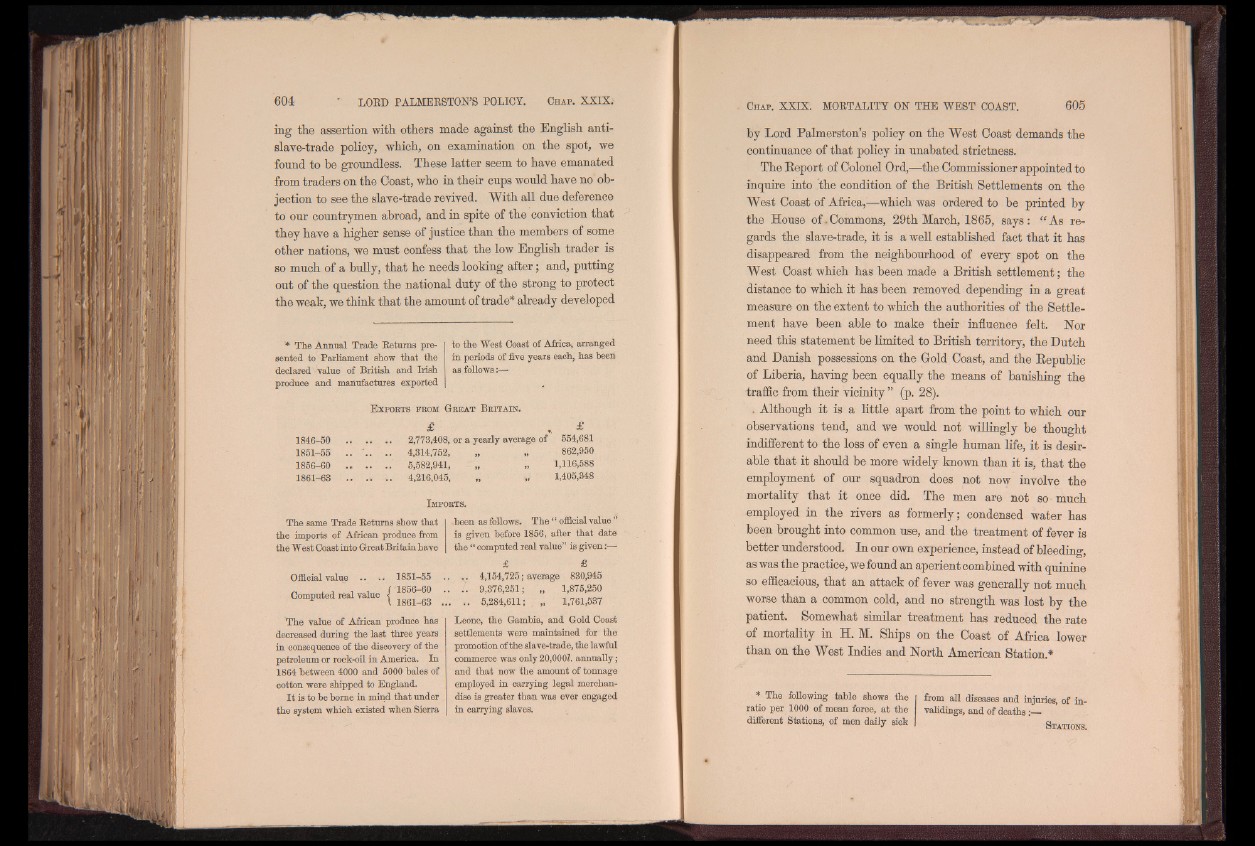
mg the assertion, with others made against the English antislave
trade policy, which, on examination on the spot, we
found to be groundless. These latter seem to have emanated
from traders on the Coast, who in their cups would have no objection
to see the slave-trade revived. With all due deference
to our countrymen abroad, and in spite of the conviction that
they have a higher sense of justice than the members of some
other nations, we must confess that the low English trader is
so much of a bully, that he needs looking after; and, putting
out of the question the national duty of the strong to protect
the weak, we think that the amount of trade* already developed
* The Annual Trade Ketums presented
to Parliament show that the
declared Value of British and Irish
produce and manufactures exported
to the West Coast of Africa, arranged
in periods of five years each, has been
as follows:—
E x p o e t s f e o m G b e a t B e i t a in .
£ i £
1846-50 2,773,408, or a yearly average of 554,681
1851-55 .. \ . .. 4,314,752, „ „ 862,950
1856-60 .................. 5,582,941* „ „ 1,116,588
1861-63 .................. 4,216,045, „ 8 1,405,348
I m p o s t s .
The same Trade Ketums show that
the imports of African produce from
the West Coast into Great Britain have
Official value ..
Computed real value j
1851-55
1856-60
1861-63
The value of African produce has
decreased during the last three years
in consequence of the discovery of the
petroleum or rock-oil in America. In
1864 between 4000 and 5000 hales of
cotton were shipped to England.
I t is to he home in mind that under
the system which existed when Sierra
been as follows. The “ official value ”
is given before 1856, after that date
the “ computed real value” is given r—
£ £
.. 4,154,725; average 8301)45
.. 9,376,251; „ 1,875,250
, .. 5,284,611; „ 1,761,537
Leone, the Gambia, and Gold Coast
settlements were maintained for the
promotion of the slave-trade, the lawful
commerce was only 20,0001. annually;
and that now the amount of tonnage
employed in carrying legal merchandise
is greater than was ever engaged
in carrying slaves.
by Lord Palmerston’s policy on the West Coast demands the
continuance of that policy in unabated strictness.
The Report of Colonel Ord,—the Commissioner appointed to
inquire into the condition of the British Settlements on the
West Coast of Africa,—which was ordered to be printed by
the House of .Commons, 29th March, 1865, says: “ As regards
the slave-trade, it is a well established fact that it has
disappeared from the neighbourhood of every spot on the
West Coast which has been made a British settlement; the
distance to which it has been removed depending in a great
measure on the extent to which the authorities of the Settlement
have been able to make their influence felt. Nor
need this statement be limited to British territory, the Dutch
and Danish possessions on the Gold Coast, and the Republic
of Liberia, having been equally the means of banishing the
traffic from their vicinity ” (p. 28).
. Although it is a little apart from the point to which our
observations tend, and we would not willingly be thought
indifferent to the loss of even a single human life, it is desirable
that it should be more widely known than it is, that the
employment of our squadron does not now involve the
mortality that it once did. The men are not so much
employed in the rivers as formerly; condensed water has
been brought into common use, and the treatment of fever is
better understood. In our own experience, instead of bleeding,
as was the practice, we found an aperient combined with quinine
so efficacious, that an attack of fever was generally not much
worse than a common cold, and no strength was lost by the
patient. Somewhat similar treatment has reduced the rate
of mortality in H. M. Ships on the Coast of Africa lower
than on the West Indies and North American Station.*
* The following table shows the from all diseases and injuries, of inratio
per 1000 of mean force, at the validings, and of deaths
different Stations, of men daily sick ’ Stations